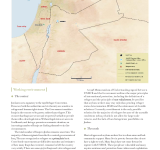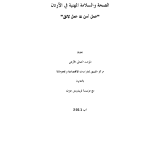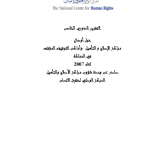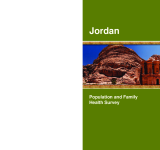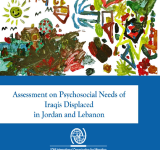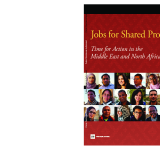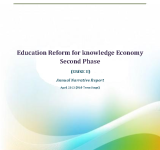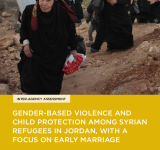services
يهدف هذا التقرير إلى تقديم قراءة تقييمية لواقع الصحة والسلامة المهنية في بيئة الأعمال الأردنية;; تتضمن قراءة في التشريعات الأردنية الخاصة بالصحة والسلامة المهنية;; إلى جانب استعراض لأبرز المعايير الدولية ذات العلاقة;; إضافة إلى تقديم قراءة لمدى موائمة التشريعات الأردنية مع المعايير الدولية في هذا المجال;; كما اعتمد التقرير في منهجيته على تحليل البيانات الاحصائية المتاحة حول الصحة والسلامة المهنية واصابات العمل;; وكما تم اجراء مقابلات مع بعض رؤساء النقابات العمالية;; وذلك إلى جانب مراجعة المعلومات والأخبار الصحية التي تناولت هذا الموضوع. ويقدم التقرير مجموعة من التوصيات التي من شأنها تحسين شروط الصحة والسلامة المهنية للعاملين في الأردن.
لقد تم إعداد هذا التقرير الخامس حول أوضاع مراكز الإصلاح والتأهيل من اجل تقييم هذه المراكز والنزلاء واماكن التوقيف والموقوفين;; وكما يكشف التقرير عن مواطن الضعف والخلل التي تعاني منها هذه المرافق. وتم الاستناد على منهجية الزيارات الميدانية الفجائية إلى تلك الاماكن;; والالتقاء بالنزلاء والموقوفين;; وكما استند التقرير أيضاً على الالتقاء بنزلاء وموقوفين سابقين وأسر بعض النزلاء الحاليين ونشطاء من المجتمع المدني.
يلخض هذا التقرير نتائج مسح السكان والصحة الأسرية في الأردن 2009 الذي أجرته دائرة الاحصاءات العامة. ونفذ هذا المسح ضمن برنامج المسوح الديموغرافية والصحية الذي صمم لجمع بيانات عن الانجاب وتنظيم الأسرة وصحة الأمهات ووفيات الأطفال والرضع والحالة التغذوية بين النساء والأطفال. تم مقابة عينة ممثلة من الأسر على مستوى المملكة بلغت 13577 أسرة;; وكذلك 10109 سيدة سبق لهن الزواج ضمن الفئة العمرية 15-49 سنة;; وتوفر هذه العينة تقديرات على مستوى المملكة ككل وعلى مستوى الحضر والريف ومناطق البادية والأقاليم الثلاثة;; وعلى مستوى المحافظات.
This report is an assessment on the psychosocial needs of Iraqis displaced in Jordan and Lebanon. The assessment included mapping;; structured interviews with stakeholders and 200 families;; and direct observations through an innovative methodology based on Hertz’s migration paradigms with a non medical focus. The results highlighted the necessity for psychosocial interventions;; since most families were rebounding in their experience of displacement;; and the challenges posed to service providers by the first massive urban displacement crisis.
Assessment of Health Needs and Living Conditions of Migrants in Jordan 2011-2012 is a cross sectional study conducted by International Organization for Migration IOM Jordan in collaboration with the Jordanian Ministry of Health to provide baseline information about health needs and challenges that affect different migrant groups in Jordan to assist the government and relevant parties to develop policy and strategies to manage migrant's health. According to the results of the study;; a number of recommendations were emerged which would be the guidance for the government and relevant parties in developing policy and strategies to improve and manage migrant's health.
The second phase of the Program Education Reform for the Knowledge Economy Program (ERfKE II) continues to build on the achievements of the first phase and follow the same implementation arrangements that have proven to be successful in (ERfKE I);; and in the same time;; focuses on schools as the locus of change as well as on the need to enhance capacity building at the central and field levels. The development objective of (ERfKE II) is to provide students enrolled in pre-tertiary education institutions in Jordan with increased levels of skills to participate in knowledge economy. Also the Mid-Term review highlighted the concrete progress achieved by (ERfKE II) in several key areas related to policy development;; quality of education interventions and school construction;; and identified the key issues as a summary of the overall progress that will be tackled and addressed during the remaining stage of implementation.
The report aims to address the particular needs and cultural dynamics of Syrian refugees residing in Jordan;; especially with regards gender-based violence and child protection issues. It presents a comprehensive range of perspectives from urban Syrian refugees and local Jordanian decision makers in government;; community-based organizations and the religious and education sectors. The assessment of this report is based on data collected through three methodologies including questionnaire survey to refugees outside the Za’atari refugee camp;; focus group discussions in regions across Jordan and in-depth interviews. Key findings of the report are 1. The rates of early marriage are high;; 2. A significant percentage of children contribute to the household’s income and 3. Restrictions on women and girls’ mobility constrain their participation in social and economic activities and access to basic services. The report recommends measures to prevent acts of sexual exploitation and abuse and ensure the needs of the most vulnerable members of the Syrian refugee population in the cities.
